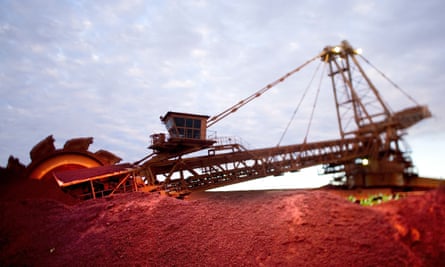It’s been a big week for BHP Billiton. For one thing, it’s not even called that any more. As part of its “Think Big” rebranding theme, the world’s biggest mining company opted to shed the Billiton moniker it acquired in a 2001 merger with a Dutch-South African company and revert to its previous true-blue Aussie name.
BHP says the rebranding – complete with TV ads about how seven ordinary blokes in the outback founded what is now a global business worth $A94bn (£54bn) – is part of a long-term plan started 18 months ago to reconnect with communities. “The timing now is good but we don’t look at it as an event,” the company’s chief external affairs officer, Geoff Healy, says. “This is a clean brand change for the company.”
The move appeared to bookend a happy period when the Anglo-Australian mining colossus had rediscovered its direction after 19 people were killed in a disastrous dam burst at an iron ore joint venture in Brazil in 2015 and the share price sank to a 10-year low.
But no sooner had BHP put the finishing touches to its fresh look on Monday than it found itself, for the second time in a month, the subject of an unflattering critique by a predatory US hedge fund.
Upsetting BHP’s big week was Elliott Advisors, whose Arsenal-supporting billionaire founder, Paul Singer, has earned a fearsome reputation for pursuing change at companies he thinks could make him more money. In April, Elliott wrote to investors demanding that BHP spin off its US oil assets and abolish its “obsolete” corporate structure that means it is listed in the UK and Australia. This week it adopted a more acrimonious tone, sledging BHP’s management for “chronic underperformance”, adopting a “do nothing” approach and destroying shareholder value to the tune of billions of dollars.
BHP has yet to comment but its new image could appeal to the patriotism of its many small Australian shareholders and help rebuff Elliott’s increasingly threatening advances. By evoking the company’s gritty origins as Broken Hill Proprietary in remote New South Wales, BHP may have claimed to be thinking big but in reality is going back to basics.
Even the Australian treasurer, Scott Morrison, got in on the act last week when he dismissed Elliott’s initial suggestions about removing BHP from the Australian stock market as “unthinkable”. For good measure he added that taking the “original big Australian” offshore could lead to legal action against executives as it would contravene the terms of the 2001 merger.

Morrison’s comments were telling and reveal that Elliott, which once seized an Argentinian warship to extract debt repayment from the Buenos Aires government, may have underestimated the attachment Australians feel towards its corporate champions.
While people in the UK are used to seeing companies and utilities bought and sold to the highest bidder – Cadbury, ICI, British Steel and Jaguar Land Rover have all disappeared or gone into foreign hands – Australians appear more attached to their big names, especially ones worth billions and which have paid handsome dividends to shareholders and pension funds down the years.
Richard Knights of the London-based investment banking and share brokerage firm Liberum Capital says Elliott had misjudged the likely political fallout from its proposal that BHP drop its stock market listing in Australia.
“I don’t think they quite grasped how much part of the corporate fabric of Australia BHP is. It has a lot of mum and dad shareholders, a lot of pension money and retirement savings. It’s a different culture to [the UK], where someone else manages your money. There’s more of a direct investment culture so there’s a cultural angle that they missed.”
He adds that the mining giant’s rebranding was also a factor. “I think it ties into this whole cultural heritage,” he says, “because they spun off most of the Billiton assets so what’s left is mostly BHP.”
While the finer points of brand awareness might not be a core consideration for a business that is focused on digging millions of tonnes of iron ore, coal and copper out of the ground, the significance is not lost on industry experts.
Andrew Holt, the chief executive in Australia of the creative agency VCCP, says the “Think Big” campaign showed BHP was going back to its roots in order to restore its “Australian-ness”.
“That would seem a timely argument if you’re trying to fight off a foreign investor,” he says.

Elliott did admit this week that amid all the discussion of “underperformance” and “unlocking optimal shareholder value”, there was a cultural dimension to the number-crunching. “We understood from the start that unification requires BHP to cut through certain complexity and that Australians in particular feel passionate about BHP remaining rooted in Australia,” the hedge fund said.
Elliott is promising to fight on. Its latest missive backtracked on scrapping the dual UK-Australia listing but it remains belligerent, claiming that BHP’s purchase of the US shale interests have cost shareholders US$23bn. So although BHP’s CEO, Andrew Mackenzie, has said he would consider selling the US shale oil business for the right price and met representatives of Elliott in Barcelona on Wednesday, it is unlikely the activist fund, which claims to speak for 4.1% of shareholders, will go quietly.
Ric Spooner, the chief market strategist at CMC Markets in Sydney, says many shareholders agreed with Elliott that BHP would be better off selling the US oil business and reinvesting the proceeds in other parts of the company.
“The problem is BHP management has a dissenting view,” he says. “They don’t agree that they would be better off by selling the oil assets. BHP believes that the advantage of oil is that it allows diversification and that it does well when other commodities do badly.”
Investec analyst Hunter Hillcoat says: “In our view, BHP’s ‘chronic underperformance’ is not as chronic as Elliott makes out and some aspects of the Elliott presentation appear disingenuous and/or made with the benefit of hindsight.
“While BHP has certainly made poor investments, in our view it has been no worse than its peers in this regard.”
He admits there might be some merit in BHP selling its petroleum business, adding that the dispute could ultimately work in shareholders’ favour, even if BHP makes no major concessions. “Whatever the outcome, Elliott’s agitation should be good for BHP shareholders, in our view, if only to create greater transparency.” And that could be a big plus at the end of the week.

Comments (…)
Sign in or create your Guardian account to join the discussion